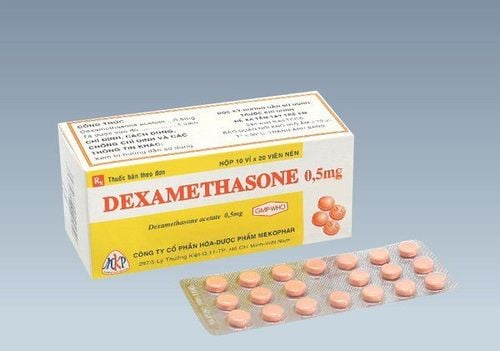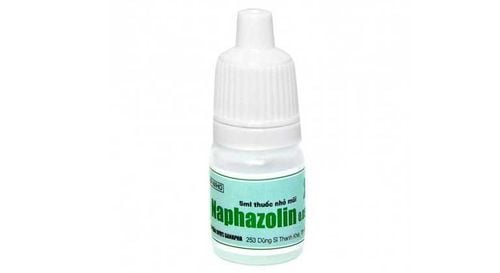This is an automatically translated article.
Dexamethasone nasal drops have a good effect in the treatment of inflammatory symptoms or allergic rhinitis. However, if used too often, improperly, the drug can cause many side effects.
1. What is Dexamethasone?
What is Dexamethasone? Dexamethasone is a water-insoluble synthetic glucocorticoid. Dexamethasone has strong anti-allergic, immunosuppressive and anti-inflammatory effects. The anti-inflammatory activity of Dexamethasone is 7 times stronger than prednisolone, 30 times stronger than hydrocortisone.
Dexamethasone has many different dosage forms such as oral, intramuscular, local injection, inhalation or topical treatment to treat many different diseases such as trauma, after surgery, bleeding shock, arthritis and Soft tissue, allergic diseases, ... Dexamethasone nasal drops are formulated to be used as drops directly into the nose to treat symptoms of inflammation or allergic conditions. Dexamethasone has a very strong local effect, quickly reducing inflammatory mediators, so it helps to relieve itching, runny nose, watery eyes, sneezing, mucosal edema, stuffy nose,...
MORE: Use safe nasal drops for stuffy nose

Thuốc dexamethason dạng dùng đường uống có thể điều trị một số bệnh như viêm khớp,sốc do chảy máu
2.Dexamethasone nasal drops side effects
Although it has a very good effect in reducing inflammation of the nasal mucosa, if used incorrectly, using the drug too often, dexamethasone nasal drops can cause side effects such as irritation of the nasal mucosa. ; blood stains in nasal secretions or nosebleeds ; cause dryness, atrophy of the nasal mucosa; damage to the nasal septum, headache, nausea, rash, ... Although very rare, when using dexamethasone nasal drops for a long time, there is a risk of systemic side effects of corticosteroids such as osteoporosis. , glaucoma , cataract , effect on growth in children,...
3. How to use Dexamethasone nasal drops properly?

Không nên tự ý dùng thuốc nhỏ mũi Dexamethasone vì có nguy cơ gây ra chậm tăng trưởng ở trẻ
To minimize the risk of side effects when using Dexamethasone nasal drops, patients should note:
Do not arbitrarily buy Dexamethasone nasal drops to use without a doctor's prescription or advice from a pharmacist. Because of the risk of growth retardation in children, parents need to talk to their doctor carefully if they need to use the drug for a long time. To ensure safety for the development of the fetus, the drug should be avoided in pregnant women during the first 3 months. Dexamethasone nasal drops are used only when safer treatments have failed and your doctor has weighed the benefits and risks. It is necessary to determine the cause of nasal congestion such as pollen allergy, pet dander, ... to proactively prevent. Dexamethasone nasal drops should not be used as the first line of treatment for a stuffy nose. First, use physiological saline or sea water mist solution to wash your nose daily. Patients need to follow the instructions on dosage, frequency of administration, number of days of use as directed by the doctor or pharmacist. Re-examination is required if the treatment is followed and the symptoms do not improve. The doctor will consider adding some drugs or adjusting the dosage to increase the effectiveness of treatment. Dexamethasone nasal drops are less absorbed into the bloodstream and cause systemic side effects, but patients need to be very careful, especially if using the drug for a long time.
Please dial HOTLINE for more information or register for an appointment HERE. Download MyVinmec app to make appointments faster and to manage your bookings easily.













